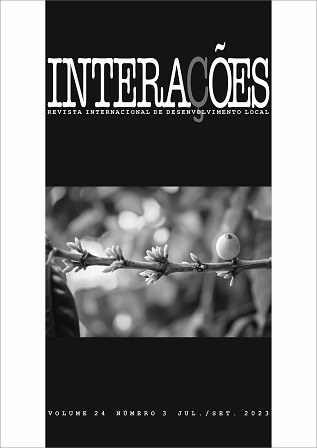Fatores condicionantes da estrutura da governança: teoria e prática no programa Pará Rural
Palavras-chave:
Pará Rural, governança, estrutura de governançaResumo
Esta pesquisa aborda a temática da governança em projetos de redução da pobreza rural, em especial o programa Pará Rural, oriundo de um empréstimo do Banco Mundial para o Governo do Estado do Pará. O estudo teve como objetivo verificar os aspectos epistemológicos envolvidos na concepção da estrutura de governança para compreender quais fatores a condicionam e como identificá-los. Para tal, foi realizada uma revisão teórica na área de governança e, em seguida, foi feita uma aplicação prática no Programa de Redução da Pobreza e Gestão dos Recursos Naturais do Pará (Pará Rural). É uma pesquisa de natureza aplicada, com objetivos exploratórios e abordagem qualitativa, em que os procedimentos técnicos utilizados para a coleta de dados foram a pesquisa documental e o levantamento de campo. Concluiu-se que a estrutura de governança identificada na pesquisa é resultado da sua forma, com base nos elementos que a compõem, sendo fruto da interação com o meio e as instituições e de sua adaptação às especificidades locais. A pesquisa mostrou que é fundamental uma compressão epistemológica multiplicidade de atores e, consequentemente, de interesses diversos. No Pará Rural, foram identificadas, como condicionantes da estrutura da governança, a ação coletiva e a estratégia adotada pela comunidade.
Referências
BEVIR, Mark. Democratic Governance. UC Berkeley: Institute of Governmental Studies, 2004. Disponível em: http://escholarship.org/uc/item/304704f2. Acesso em: 20 fev. 2020
BRUYNE, Paul.; HERMAN, Jacques; SCHOUTHEETE, Marc. Dinâmica da pesquisa em ciências sociais: os pólos da prática metodológica. Rio de Janeiro: Francisco Alves. 1977
EZZAMEL, Mahmoud; REED, Mike. Governance: a code of multiple colours. Human Relations, Londres, v. 61, n. 5, p. 597-615, 2008. Disponível em: http://dx.doi.org/10.1177/0018726708092316. Acesso em: 07.08.2020
FAWCETT, Paul; DAUGBJERG, Carsten. Explaining governance outcomes: Epistemology, network governance and policy network analysis. Political Studies Review, Londres, v. 10, n. 2, p. 195-207, 2012. Disponível em: https://onlinelibrary.wiley.com/doi/abs/10.1111/j.1478-9302.2012.00257. Acesso em: 08.06.2020
FUNG, Archon; WRIGHT, Erik Olin. Deepening democracy: innovations in empowered participatory governance. Politics and society, Londres, v. 29, n. 1, p. 5-42, 2001.
GIL, Antônio Carlos. Métodos e técnicas de pesquisa social. São Paulo: Atlas, 1999.
HUFTY, Marc. Governance: Exploring four approaches and their relevance to research. Research for sustainable development: foundations, experiences, and perspectives, p. 165-83, 2011a. Disponível em: https://www.researchgate.net/publication/216756437_Governance_Exploring_four_approaches_and_their_relevance_to_research. Acesso em: 16 nov. 2020.
HUFTY, Marc. Investigating policy processes: the governance analytical framework (GAF). Research for sustainable development: foundations, experiences, and perspectives, p. 403-24, 2011b. Disponível em: https://www.nccr-north-south.unibe.ch/Upload/20_Hufty_GAF.pdf. Acesso em: 13.09.2019
KOOIMAN, Jan; BAVINCK, Maarten; CHUENPAGDEE, Ratana; MAHON, Robin; PULLIN, Roger. Interactive governance and governability: an introduction. The Journal of Transdisciplinary Environmental Studies, Nova York, v. 7, n. 1, p. 1-11, 2008. Disponível em: https://dare.uva.nl/search?identifier=ced27a4a-5fa1-41c9-b34a-63576058307e. Acesso em: 28.07.2020
MARCONI, Marina; LAKATOS, Eva Maria. Fundamentos de metodologia científica. 7. ed. São Paulo: Atlas, 2010.
OLSON, Mancur. A lógica da ação coletiva: os benefícios públicos e uma teoria dos grupos sociais. São Paulo: Edusp, 1999.
OSTROM, Elinor. Governing the commons: the evolution of institutions for collective action. Cambridge: Cambridge University Press, 1990. Disponível em: https://www.actu-environnement.com/media/pdf/ostrom_1990.pdf. Acesso em: 20.08.2019
PROGRAMA DE REDUÇÃO DA POBREZA E GESTÃO DOS RECURSOS NATURAIS DO PARÁ [PARÁ RURAL]. Concepção e implementação do programa. Pará Rural, jan. 2014. (V. 1.).
RAUPP, Fabiano; BEUREN, Ilse Maria. Metodologia da pesquisa aplicável às ciências sociais. In: BEUREN, Ilse Maria (Org.). Como elaborar trabalhos monográficos em contabilidade: teoria e prática. São Paulo: Atlas, 2003.
RHODES, Roderick. ‘Understanding Governance: 20 Years On’, ‘领导科学论坛·国家治理评论’ (丁煌 translator). National Governance Review, Wuhan, v. 5, p. 5-17, 2016
SÁ, Samuel. “Interdisciplinaridade: sim e não a vasos comunicantes em educação pós-graduada”. Cadernos de Saúde Pública, Rio de Janeiro, v. 3, n. 3, p. 272-79, 1987.
SILVA, Edna; MENEZES, Estera. Metodologia da pesquisa e elaboração de dissertação. Laboratório de Ensino a Distância da UFSC, 2000 . Disponível em: http://200.17.83.38/portal/upload/com_arquivo/metodologia_da_pesquisa_e_elaboracao. Acesso em: 15 jan. 2021.
ZUMBANSEN, Peer. Governance: an interdisciplinary perspective. In: LEVI-FAUR, David (Ed.). The Oxford handbook of governance. [S.l.]: Oxford University Press, 2012.
Downloads
Publicado
Como Citar
Edição
Seção
Licença
Copyright (c) 2023 Brenda Cordovil, Nirvia Ravena

Este trabalho está licenciado sob uma licença Creative Commons Attribution 4.0 International License.
Direitos Autorais para artigos publicados nesta revista são do autor, com direitos de primeira publicação para a revista. Em virtude de aparecerem nesta revista de acesso público, os artigos são de uso gratuito, com atribuições próprias, em aplicações educacionais e não-comerciais.


